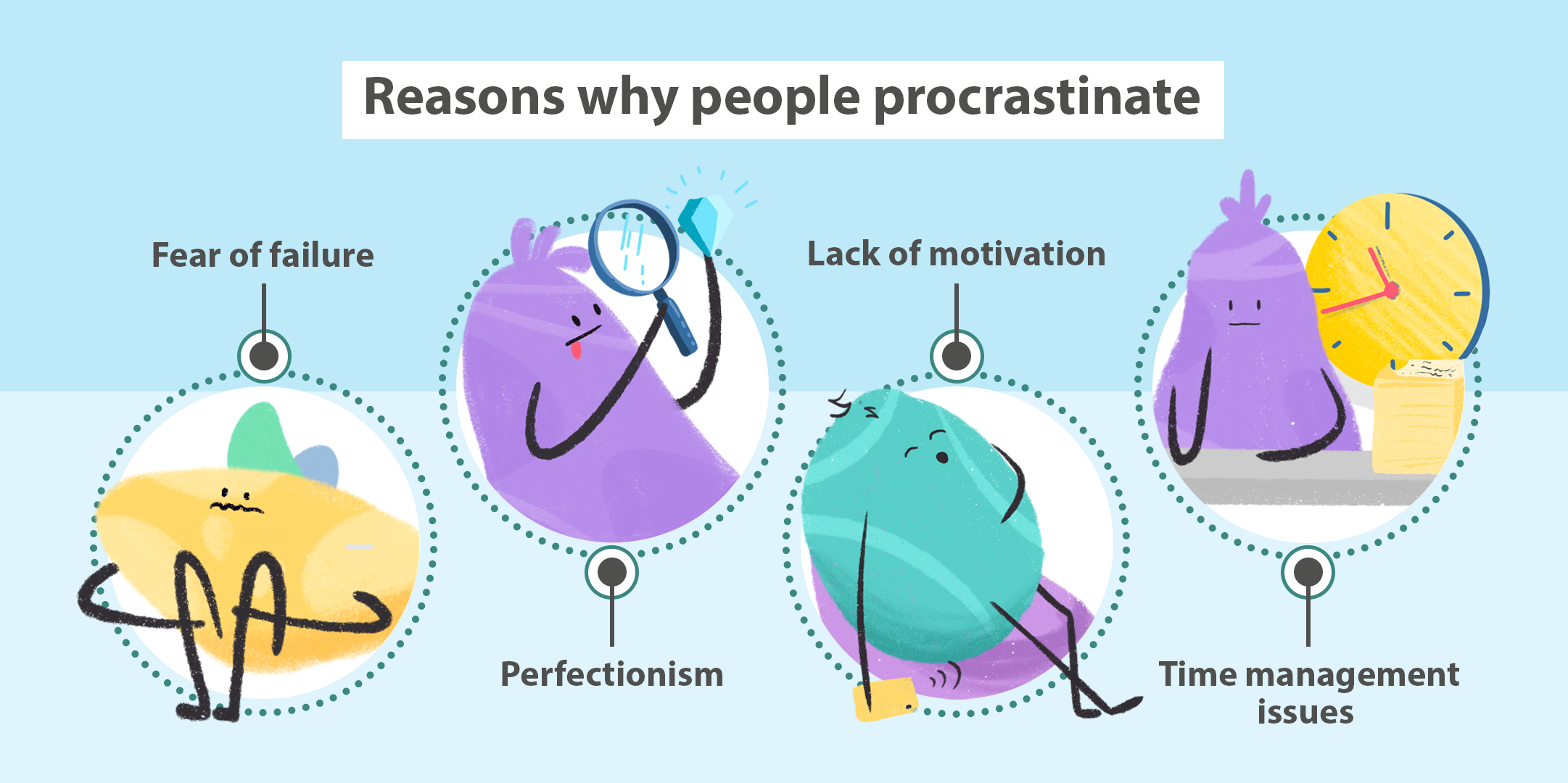
Anxiety due to an approaching deadline while the task is not even started is a feeling too many are familiar with. Procrastination, or the conscious act of delaying duties or an unpleasant task, is often used synonymously with laziness. However, that’s not the case.
Procrastination refers to postponing specific tasks because of an emotional response to them. Fear of failure, perfectionism, or simply the tediousness of activity can be the culprit.
In this article, we will delve deeper into procrastination behavior, explore its causes, look for ways to fight procrastination and learn how to finally complete the task you have been delaying for too long.
In this article
Procrastination unveiled: what is it really?
Procrastination, a decision to postpone or delay a specific task, is a behavioral pattern caused by unpleasant feelings toward activities.
While many still believe procrastination and laziness are synonymous, that’s false. Chronic procrastination often causes stress, guilt, and serious consequences, such as missed deadlines or poor performance.
This means that procrastinators avoid specific tasks because of an existing mental block. On the other hand, laziness is putting things off for later, even if one can do it right now.
Hence, the main difference between the two terms is the mental outlook on the task and self-discipline.
The psychology behind procrastination
Procrastination is not a mental illness or condition but a behavioral tendency; thus, it cannot be treated traditionally.
However, while emotions and learned behaviors can highly influence the need to procrastinate, overcoming them includes changing said behaviors and regulating moods.
To better understand procrastination, discussing why procrastination habits arise is essential. Several factors can make a person procrastinate, including:
- Fear of failure. People may avoid tasks that they fear they will fail at. Usually, either because they lack confidence in their abilities or because they don’t want to experience the disappointment of not achieving goals they set for themselves. Often, people with low self-esteem are scared of failing.
- Perfectionism. Some people may feel compelled to perform tasks to a very high standard. People with low self-esteem often aim for perfection – this can lead to procrastination if they think they cannot meet their own expectations.
- Lack of motivation. If a task does not seem exciting or enjoyable, people may avoid it in favor of more pleasurable activities, especially if the action causes more stress than usual.
- Time management issues. Procrastination can occur if a person feels overwhelmed by their work or struggles to manage their time effectively.
It’s challenging to overcome procrastination when one or several factors influence emotional responses to assignments. Hence, to do it, it’s vital to understand the individual reasons affecting you and work on improving them.
Unpacking the causes of procrastination
There can be various reasons why people procrastinate, all closely tied to the influencing factors listed above. However, each person avoids essential tasks due to individual differences and situations.
For some, it might be unenjoyable work – an exhausting academic environment for college students. It’s vital to figure out the main reason for procrastination as it also tends to spill out to other life areas.
Academic pressures
It’s no secret that studying can be tiresome and stress-inducing. Hence, many young people in academic environments experience academic procrastination.
Getting a degree provides long-term rewards, but it’s hard work with no immediate results. In addition, sleep deprivation, massive workload, and massive stress levels due to exams and deadlines, in addition to personal life fluctuations, jobs, and personal goals, can make people feel overwhelmed.
The intense life rhythm of a college student can cause procrastination and even mental or physical illness.
Present bias: choosing the immediate over the future
Similarly, as in the case of academic procrastination, long-term benefits can be hard to seek in the workplace, relationships, and personal projects. Therefore, many people choose instant enjoyment instead of working toward their goals.
This action of postponing urgent activities to feel satisfied at the moment is called immediate gratification.
While allowing yourself time for self-care and unwinding is crucial for mental health, forgetting about the future rewards can have negative consequences and is also damaging to your future self.
Procrastination and mental health: links to depression, OCD, and ADHD
While procrastination can affect anyone, studies suggest that people suffering from depression, OCD, and ADHD are more likely to procrastinate due to low self-worth, perfectionism, and lack of attention, among others.
It’s essential to take good care of one’s mental well-being and treat existing conditions with the help of mental health professionals to stop procrastinating, as comorbidities might affect your behavior.
The many faces of procrastination: types and traits
Procrastination isn’t a one-size-fits-all behavior – it takes on various forms based on personal characteristics and situations. Understanding the different types of procrastination can illuminate why people delay activities and help identify effective strategies for change.
Perfectionist procrastinators, for instance, are often driven by a fear of not meeting their high standards. They may spend excessive time planning but struggle to execute their plans due to fear of failure.
On the other hand, avoidant procrastinators tend to put off tasks to avoid discomfort or negative emotions. They may engage in distractions to escape feelings of anxiety or inadequacy.
Trait-based procrastinators exhibit these tendencies across various areas of their lives, not just in specific situations. Some individuals procrastinate due to a lack of self-regulation, where they struggle to resist immediate temptations even if they’re aware of the long-term negative consequences.
Active vs. passive procrastinators: who are they?
Procrastinators can generally be categorized as active or passive based on their approach to delay.
Active procrastination refers to the ability to work well under pressure and the belief that you perform better when the deadline looms. Active procrastinators actively choose to delay assignments but often manage to deliver high-quality work.
In contrast, passive procrastination occurs when people find themselves delaying tasks due to a lack of motivation, disorganization, or fear of failure. They often rush to complete tasks at the last minute, producing subpar results.
Active procrastinators might experience short bursts of productivity, but their consistent last-minute approach can lead to unnecessary stress.
Passive procrastinators, on the other hand, might struggle with time and breaking the cycle of delay. Recognizing which type aligns more with your tendencies can help devise effective strategies to overcome procrastination.
Chronic procrastinators
Chronic procrastination goes beyond occasional delay and becomes a repeating pattern across various aspects of one’s life.
This type of procrastination is characterized by consistently putting off activities even when it has serious consequences. Unlike occasional procrastinators who may experience guilt or stress about their delays, chronic procrastinators might demonstrate a lack of concern about their behavior despite its impact.
This type of procrastination often occurs in specific contexts, such as academic procrastination, work-related delays, or even procrastination in parenting responsibilities.
These procrastinators often struggle with low self-worth, managing time effectively, and emotional regulation challenges. The underlying causes can be complex, involving factors such as perfectionism, fear of failure, and executive function deficits.
A multifaceted approach involving self-awareness, therapy, and developing practical strategies for task initiation is required to beat chronic procrastination.

Consequences of procrastination: the hidden costs
Procrastination might seem harmless in the short term, but its consequences can extend far beyond mere delay.
The cost of procrastination can impact various aspects of life, leading to increased stress, missed opportunities, and reduced overall well-being. Understanding these consequences can serve as a powerful motivator to overcome procrastination.
Impact on mental health
The toll procrastination takes on mental health can be substantial. As tasks accumulate and deadlines approach, people often experience heightened stress, anxiety, and guilt.
The constant pressure of unfinished work can erode self-esteem and lead to a cycle of negative self-talk. Additionally, studies suggest that looming deadlines can hinder sleep patterns, can be responsible for poor health, and exacerbate existing mental and physical health conditions.
Procrastination also sabotages the sense of accomplishment and fulfillment of completing a task. The longer a task remains unfinished, the more individuals might experience a sense of dissatisfaction with themselves.
Impact on performance and success
Procrastination has a massive impact on a person’s performance and overall success. Missed deadlines, rushed work, and subpar outcomes are expected consequences of delaying tasks.
Work quality can suffer when assignments are completed hastily. This can lead to missed opportunities for recognition and advancement in the workplace, academic environment, and other areas of life.
Additionally, the habits formed through procrastination can become a roadblock to achieving long-term goals. Consistently delaying an important task can hinder progress and prevent people from reaching their full potential.
It’s not only the immediate task that suffers – the cumulative effect of repeatedly pushing responsibilities aside can impede personal and professional growth.
By addressing procrastination and adopting strategies to overcome it, individuals can pave the way for improved performance, enhanced achievements, and a greater sense of accomplishment in various aspects of their lives.
Strategies to beat procrastination: practical solutions
It is debatable whether overcoming procrastination entirely is possible. Motivation can decrease if certain situations produce adverse emotions; sometimes, people might seek immediate gratification instead of working extensively – that’s completely normal.
However, through self-control, they can experience a decrease in their quality of life due to putting things off all the time. In this case, it’s essential to seek help.
However, while managing procrastination can be tiresome, it has plenty of long-term benefits – more productivity, less stress about approaching deadlines, and improved self-discipline.
These traits can benefit your career, personal projects, and relationships, help you get through a tedious task, and assist in many other areas of your life.
How to make rewards of action immediate
It can be hard to stop procrastinating if your work feels unmotivating and tedious. However, you can find a new sense of accomplishment by creating a reward system and switching up boring assignments with enjoyable activities occasionally.
Our brains are wired to seek instant gratification, so incorporating small, enjoyable rewards upon task completion can increase motivation and decrease the need to procrastinate.
These rewards could be as simple as a brief break, a favorite snack, or a moment of leisure. By associating positive outcomes with task completion, individuals can bypass the allure of procrastination.
How to increase consequences of procrastination
In the case of active procrastination, people tend to be very efficient when under stress – looming deadlines motivate them. While active procrastination is found to be an effective coping technique to manage workload and one’s emotions, sometimes the stakes might be too high to procrastinate.
Creating consequences for procrastination can provide a powerful incentive to tackle tasks promptly. Sharing goals and deadlines with a trusted friend or colleague can introduce an element of external accountability.
Knowing that someone else is aware of your commitments can reduce the temptation to delay.
Additionally, setting up adverse outcomes for an unfinished task, such as forfeiting a leisure activity, can help increase the costs of procrastination, making it less appealing.
Designing future actions for success
People tend to believe that once they achieve something – a promotion, a partner and a family, a new house, etc. – things will inevitably change for the better. However, that’s rarely the case.
To pave your way to success, it’s essential to work for it consistently. One effective strategy to stop procrastinating is to design future actions for success.
For example, laying out necessary materials the night before, organizing workspaces, and breaking down tasks into smaller steps can eliminate common barriers to starting. Creating an environment conducive to productivity can minimize the resistance often associated with getting started.
Breaking down tasks to make them more achievable
Procrastination can often arise from the overwhelming nature of a task. Breaking tasks into smaller, manageable components can make them feel less daunting and increase the likelihood of initiating action.
The “five-minute rule,” which suggests tackling tasks that can be completed in five minutes or less, can prevent small tasks from accumulating and becoming overwhelming. By focusing on each step one at a time, you can build momentum, make progress more consistently, and escape the self-defeating behavior pattern.
Using aid for procrastinators: Sensa
While procrastination has a lot to do with your approach and emotions toward certain activities and projects, having aid to work through difficult times can provide a sense of relief.
Sensa is a cognitive-behavior therapy (CBT) based app that assists people with mental illness or conditions to become the best version of themselves. While procrastination is not a disease but a pattern of human behavior, Sensa has much to offer for those who wish to overcome and prevent procrastination in the future.
By teaching the background of why you procrastinate and providing practical solutions to your specific problems, Sensa teaches how to set priorities, problem-solving, and how to complete household chores and other large tasks with ease.
With daily tasks, reminders, mindfulness practices, and more, Sensa helps make sense of your negative thoughts and shows you how to experience them without sabotaging your success.
Time management and procrastination
Effectively managing time is a powerful weapon against procrastination. By understanding the connection between how we manage our time and our desire to delay tasks, you can harness these management techniques to overcome procrastination’s grip, improve impulse control, and enhance productivity.
Time management techniques to curb procrastination
A long to-do list can be overwhelming and unnecessarily increase stress levels. Instead, creating a smaller to-do list, or a priority list, can separate all duties into small, manageable chunks and plan ahead.
While the most urgent tasks might be the reason for procrastination, having priorities provides clarity and allows one to concentrate on critical assignments or a single project instead of the whole workload.
Also, techniques like the Pomodoro Technique or Eisenhower Matrix can be helpful.
The Pomodoro Technique, for instance, involves breaking work into focused intervals followed by short breaks. This structured approach not only enhances focus but also alleviates the overwhelming feeling of prolonged tasks.
The Eisenhower Matrix categorizes tasks into urgent and important quadrants, guiding individuals to prioritize and tackle them strategically.
The role of routines and visual cues in fighting procrastination
Developing a daily routine helps you keep track of your activities throughout the day and enables you to manage your time more effectively.
Create a routine involving exercise, cleaning, cooking, and socialization. Don’t forget to dedicate time to your hobbies, plan meal times, and include important tasks or meetings.
People who procrastinate tend to avoid chores and seek instant gratification. Following a routine helps balance leisure and work more efficiently. The Sensa app offers an activity tracker to help establish a routine and prevent procrastination.
Moreover, incorporating visual cues, such as setting out necessary materials or creating task-specific environments, triggers the brain to associate these cues with assignment initiation. The visual signal can be a to-do list on your device’s screen, specific materials, clothing, items required for the task, etc.
Integrating routines and visual cues creates a seamless transition from intention to action. The predictability and visual reinforcement these elements provide can disrupt the need to procrastinate and encourage consistent engagement with a task at hand.
Embrace action, conquer procrastination
In the journey to overcome procrastination, you hold the reins. Equipped with an understanding of its underlying causes, various types, and potential consequences, you have the power to transform the way you approach a task or responsibility.
Whether you’re battling perfectionist tendencies, learning how to manage time, or seeking to enhance your mental well-being, the path to overcoming procrastination lies within your grasp.
Employ techniques that make the rewards of action immediate, leverage accountability to heighten the consequences of delay, and design your environment for success. Don’t be afraid to ask for help from your peers or use tools like Sensa to help you stay on track. Your future self will thank you.
Each action you take, no matter how modest, brings you closer to becoming organized and productive. Become one of the organized people and experience the positive effects of having a consistent schedule, no mental blocks, and tools to help you when you need it.
Frequently Asked Questions
How to stop procrastination?
Procrastination is the avoidance of unpleasant or difficult tasks. It is a common problem that can affect people of all ages and backgrounds. While occasional procrastination may not be a serious issue, chronic procrastination can lead to stress, anxiety, and missed opportunities.
Here are some tips on how to stop procrastination:
- Identify your procrastination triggers: What are the situations or thoughts that make you procrastinate? Once you know your triggers, you can start to avoid them or develop strategies to cope with them.
- Break down large tasks into smaller, more manageable steps: This will make the tasks seem less daunting and more achievable.
- Set realistic deadlines for yourself: Don’t set yourself up for failure by giving yourself too much to do in too little time.
- Reward yourself for completing tasks: This will help to motivate you and make the process more enjoyable.
- Get organized and eliminate distractions: Create a workspace that is free from clutter and distractions.
- Tackle the most difficult tasks first: This will help you to get the most challenging part of the task out of the way and make the rest of the work seem easier.
- Don’t be afraid to ask for help: If you’re struggling to complete a task, don’t be afraid to ask for help from a friend, family member, or colleague.
Why do people procrastinate?
There are many reasons why people procrastinate. Some of the most common reasons include:
- Fear of failure: People may procrastinate because they are afraid of not being able to complete a task or because they are afraid of being judged for their work.
- Perfectionism: People may procrastinate because they want to do a task perfectly, and they are afraid of not being able to meet their own high standards.
- Avoidance of negative emotions: People may procrastinate because they are trying to avoid negative emotions such as anxiety, boredom, or frustration.
- Distractions: People may procrastinate because they are easily distracted by things like social media, email, and phone calls.
- Lack of motivation: People may procrastinate because they are not motivated to do a task.
What are 3 solutions to procrastination?
Here are 3 of the most effective solutions to procrastination:
- Identify your procrastination triggers and avoid them: If you know what makes you procrastinate, you can start to avoid those situations or thoughts. For example, if you procrastinate when you’re working from home, try going to a coffee shop or library to work instead.
- Break down large tasks into smaller steps: This will make the tasks seem less daunting and more achievable. For example, if you have a big project that you’re procrastinating on, break it down into smaller, more manageable tasks, such as doing research, writing an outline, and writing drafts.
- Set realistic deadlines for yourself: Don’t give yourself too much to do in too little time. This will only make you feel overwhelmed and stressed. Instead, set realistic deadlines that you are confident that you can meet.
Can procrastination be a mental illness?
In some cases, procrastination can be a symptom of a mental illness, such as anxiety or depression. If you are struggling with chronic procrastination and it is causing you significant distress or impairment in your daily life, you should see a doctor or mental health professional to rule out any underlying mental health conditions.
Here are some additional tips for dealing with procrastination:
- Talk to someone about your procrastination: Talking to a friend, family member, or therapist can help you to identify the root of your procrastination and develop strategies for overcoming it.
- Join a support group: There are many support groups available for people who are struggling with procrastination. Joining a support group can provide you with motivation and encouragement from others who are going through the same thing.
- Make small changes to your lifestyle: Some small changes to your lifestyle, such as getting enough sleep, eating healthy, and exercising regularly, can help to reduce stress and improve your overall well-being, which can make it easier to overcome procrastination.
References:
- Burka, J. and Yuen, L.M., 2007. Procrastination: Why you do it, what to do about it now. Hachette Uk.
- Chun Chu, A.H. and Choi, J.N., 2005. Rethinking procrastination: Positive effects of” active” procrastination behavior on attitudes and performance. The Journal of social psychology
- Milgram, N.A., Sroloff, B. and Rosenbaum, M., 1988. The procrastination of everyday life. Journal of Research in Personality, 22(2), pp.197-212.
- Wilson, B.A. and Nguyen, T.D., 2012. Belonging to tomorrow: An overview of procrastination. International Journal of Psychological Studies, 4(1), p.211.
- Senécal, C., Koestner, R. and Vallerand, R.J., 1995. Self-regulation and academic procrastination. The journal of social psychology, 135(5), pp.607-619.
- Rozental, A. and Carlbring, P., 2014. Understanding and treating procrastination: A review of a common self-regulatory failure. Psychology, 5(13), p.1488.
- Klingsieck, K.B., 2013. Procrastination in different life-domains: Is procrastination domain specific?. Current Psychology, 32, pp.175-185.





